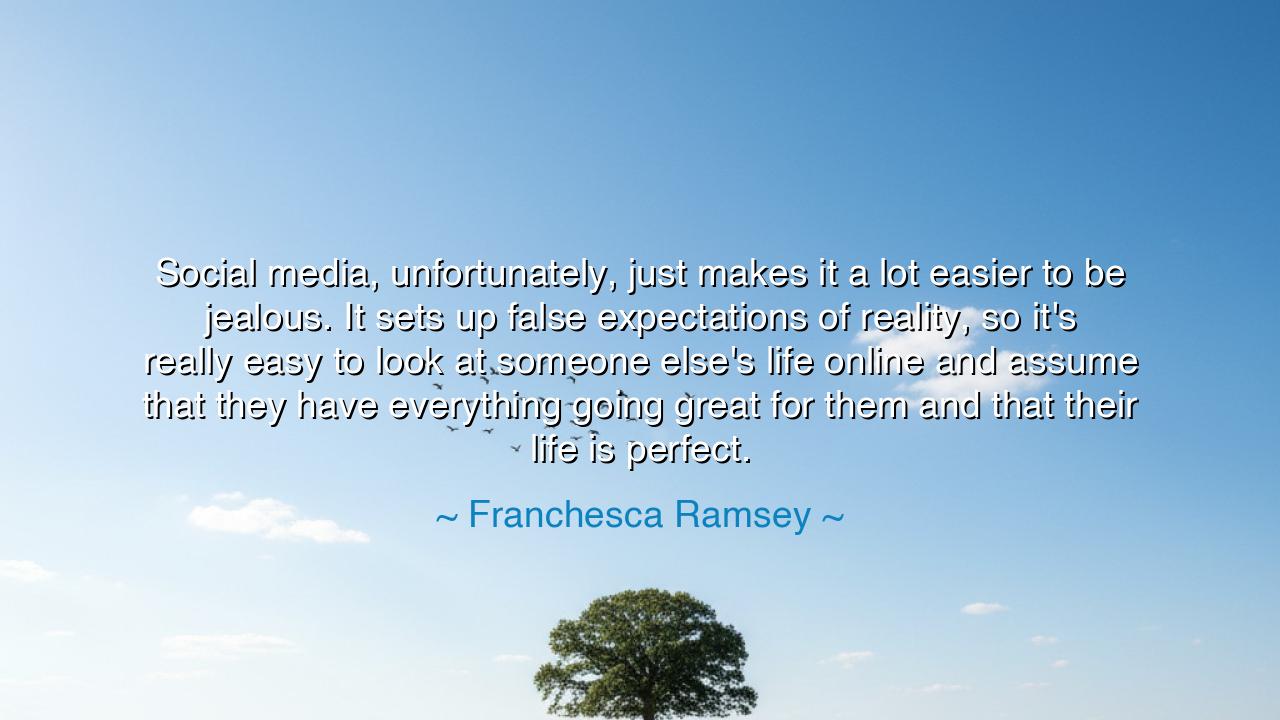
Social media, unfortunately, just makes it a lot easier to be
Social media, unfortunately, just makes it a lot easier to be jealous. It sets up false expectations of reality, so it's really easy to look at someone else's life online and assume that they have everything going great for them and that their life is perfect.






In the age of glowing screens and endless comparisons, Franchesca Ramsey spoke with the clarity of one who has seen the illusion for what it is: “Social media, unfortunately, just makes it a lot easier to be jealous. It sets up false expectations of reality, so it's really easy to look at someone else's life online and assume that they have everything going great for them and that their life is perfect.” These words, though born from the modern world, carry the eternal wisdom of the ancients — that envy is a poison of the soul, and that appearances are the most deceptive of all idols. Ramsey’s reflection is not a complaint, but a warning, a call for awakening in an era that has mistaken the shadow for the light.
In her truth, she reminds us that the human heart has not changed through the centuries — only the tools of temptation have. Once, people gazed across villages and envied the wealth of their neighbor, the beauty of a singer, the wisdom of a scholar. Now, through the mirror of social media, we gaze upon the entire world at once and see only what others choose to show. The feast before our eyes is false, for it is carefully prepared: filtered, edited, and painted to hide the truth of struggle and imperfection. What was once the whisper of jealousy has become a storm.
The ancients, too, knew this peril. In the days of Ancient Greece, the philosopher Epictetus warned, “It is not what happens to you, but how you react to it that matters.” Yet today, surrounded by images of endless happiness and achievement, we forget that much of what we see is not real. Like the travelers who mistook the sirens’ song for beauty, we are drawn toward illusion, believing others’ lives to be more radiant than our own. But the siren’s melody was never truth — it was a mask. So too is the glossy world of digital perfection. Beneath the polished smiles lie struggles unspoken, grief unseen, doubts unshared.
Ramsey’s observation arises from the heart of this modern conflict: that we are losing touch with what is real. Social media has made the stage of life vast and brilliant, but it has also deepened the shadows behind the curtain. Each post, each image, becomes a performance, and the audience — ourselves — forgets that we are watching a play. The false expectations she speaks of are not only about others’ lives, but about our own. We begin to measure our worth against illusions, to chase approval instead of authenticity, to feel lesser for not living in a fantasy that never existed.
History offers a thousand mirrors for this lesson. Consider Emperor Nero, whose vanity consumed his empire. Surrounded by wealth and flattery, he lived in an echo chamber of illusion — a world where only perfection was permitted. But his false reality, built on appearances, crumbled into madness and ruin. What destroyed him was not his power, but his blindness to truth. Today, we are in danger of the same — not as emperors, but as ordinary souls seduced by the perfection of others. To live by comparison is to build one’s life upon sand, and the tide of envy will always wash it away.
Ramsey’s words invite us back to humility and awareness. To “accept reality” is not to reject beauty, but to embrace authenticity — to see life as it is, imperfect and glorious in its imperfection. The wise know that happiness is not found in what others display, but in the quiet, private corners of one’s own soul. True joy needs no witness, no audience, no validation. The moment we stop comparing, we rediscover gratitude — the gentle peace of being enough, of living fully in one’s own story instead of envying the illusions of others.
The lesson, then, is both timeless and urgent: guard your heart against envy, and guard your mind against illusion. When you gaze into the endless scroll of lives not your own, remember that what you see is but a fragment, a painting, never the whole. Seek instead the reality beneath the surface — the shared humanity that connects all souls, each carrying both joy and pain. Live truthfully, not performatively. Create moments worth living, not just moments worth showing.
So, my children of the digital age, take heed of Franchesca Ramsey’s wisdom. Do not measure your life by the mirages of others, for envy will always blind you to your blessings. Instead, root yourself in gratitude, authenticity, and compassion — for yourself and for those who hide their struggles behind smiles. Be the one who steps off the stage, who walks away from illusion, and who dares to live honestly in the real and imperfect world. For in that truth lies freedom — and in that freedom, the deepest kind of happiness.






AAdministratorAdministrator
Welcome, honored guests. Please leave a comment, we will respond soon